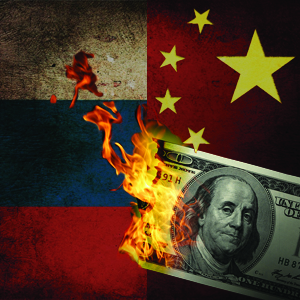 The U.S. dollar has been the world’s strongest currency for decades. Recently, however, this exalted position has shown signs of weakening. A disturbing national debt situation and a sputtering economic recovery are the main reasons why Russia and China have each taken steps to distance themselves from the U.S. dollar.
The U.S. dollar has been the world’s strongest currency for decades. Recently, however, this exalted position has shown signs of weakening. A disturbing national debt situation and a sputtering economic recovery are the main reasons why Russia and China have each taken steps to distance themselves from the U.S. dollar.
According to an article in the Washington Times, Mikhail Degtyarev, a member of Russia’s nationalist Liberal Democrat Party, has submitted a bill to Russia’s parliament this past week that would ban the use or possession of the American currency. The failed Moscow mayoral candidate cites fear of a collapse of the U.S. dollar as the basis for this bill.
“If the U.S. national debt continues to grow, the collapse of the dollar system will take place in 2017,” Mr. Degtyarev says.
“The countries that will suffer the most will be those that have failed to wean themselves off their dependence on the dollar in time. In light of this, the fact that confidence in the dollar is growing among Russian citizens is extremely dangerous,” said Mr. Degtyarev.
A similar ban was placed on the dollar during the Soviet-era. While not quite as extreme, this bill would prohibit Russian citizens from holding dollars in the country’s banks, and banks would be unable to carry out transactions in the dollar. The bill would not prevent Russians from buying or selling dollars while abroad, however, and they could still hold dollar accounts in foreign banks.
Financial Analyst Andrei Shenk warns that the bill would harm Russia’s investment climate. He says, “The American financial system, despite all its existing problems, remains the most stable and low-risk in the world.”
This bill comes on the heels of an announcement that the Shanghai Futures Exchange could price its crude oil futures contract in the Chinese yuan. According to zerohedge.com, the exchange’s chairman has stated that they are speeding up preparatory work to secure the regulatory approvals needed to make this move.
The U.S. dollar remains the world’s strongest currency mainly because of its status as the petrodollar, making it the only currency in which countries with weaker economies can purchase energy. There have already been warning signs that the petrodollar collapse is on the horizon and this announcement will only add credence to these claims.
Much like the situation in Russia, the severity of this report may be a bit overstated according to some. Experts with direct knowledge of the plan have stated that the contract would be in both yuan and dollars.
Nevertheless, it does appear that both world powers are testing the waters to see what a global economy would be like without the U.S. dollar on top.

